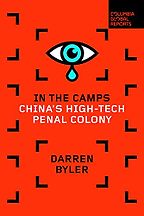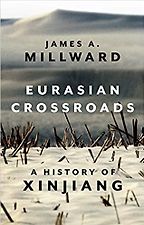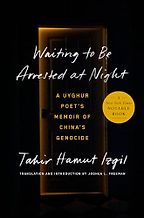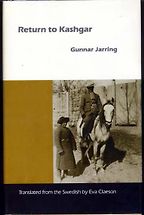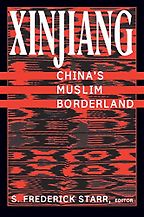Xinjiang Books
recommended by historians
Last updated: April 01, 2025
Xinjiang, in the far northwest of China, is the country's largest province. It borders six countries (Kazakhstan, Kyrgyzstan, Tajikistan, Afghanistan, Pakistan, Russia and Mongolia) and was a key part of the ancient Silk Roads, with lots of cultural and economic exchange taking place. Today, Xinjiang is often in the spotlight due to the Chinese government's horrifying crackdown on its Uyghur population.
For a big-picture book (not focused on Xinjiang), The Silk Roads: A New History of the World by Oxford historian Peter Frankopan looks at ancient trade routes and argues for the region's importance in global history. For a history of Xinjiang specifically, there's the highly recommended Eurasian Crossroads: A History of Xinjiang by James A. Millward, a professor at Georgetown University.
For a human perspective, there are several memoirs to choose from, including The Land Drenched in Tears by Söyüngül Chanisheff, about the author's traumatic experiences during the Cultural Revolution. 2023 saw the publication in English of Waiting to Be Arrested at Night: A Uyghur Poet's Memoir of China's Genocide by the poet Tahir Hamut Izgil.
Read more about books on Xinjiang that have been recommended on Five Books below:
“What’s important about In the Camps is that there hasn’t been a short, deeply informed book about Xinjiang that you could point somebody to who says, ‘I don’t have a lot of time to devote to this subject, but I want to go deeper than I can even through a long-form journalism piece’…In the Camps is designed to give a feel for the human experience of having the ground pulled out from under you in every conceivable way. Forms of movement become constrained, everything you’re doing is watched. People are disappearing into camps, but also going silent because of fear of being targeted. It’s an incredibly important story.” Read more...
Jeffrey Wasserstrom, Historian
Eurasian Crossroads: A History of Xinjiang
by James Millward
It's hard not to be aware of what is going in Xinjiang (literally 'new province') in western China where concentration camps are making a comeback. It's where the Uyghurs live, a generally Muslim ethnic minority who have never appreciated being ruled from Beijing. Historically, relations between the Uyghurs and Beijing have tended to go downhill when the centre is too controlling, and the last two decades have been a disaster. In this updated edition of Eurasian Crossroads James Millward, a leading American historian of the region, explains the historical context of a situation we all have a responsibility to be aware of.
Waiting to Be Arrested at Night: A Uyghur Poet's Memoir of China's Genocide
by Tahir Hamut Izgil and translated by Joshua Freeman
“I did include the most beautifully written book about Xinjiang I’ve come across, not just during this year but ever, which is by a Uyghur poet. The repression in Xinjiang keeps seeming, finally, to be getting global attention, but then other crises come up and it gets shuffled to the back of people’s minds. There are reasons to try to keep bringing it to the front of them…It’s a very personal story, framed partly around looking back at get-togethers that he had with other artists and intellectual figures involved with film and poetry, and the way that the space for them to live kept on narrowing. They had to become more and more cautious. And then, some of them began disappearing into camps. He is intensely aware that he was one of the lucky ones who managed, along with his family, to get out at a time when the space was disappearing.” Read more...
Jeffrey Wasserstrom, Historian
“Gunnar Jarring…had experience in Xinjiang and the surrounding area from 1929 onwards. He was an internationally respected Swedish diplomat who held ambassadorial posts all around the world…However, at the same time he carried on with his scholarship in what we would today call Uyghur studies, although the word Uyghur was not used very much in those days. His book, Return to Kashgar, is not particularly well-known but it is interesting because it contrasts a visit he made in 1978 with his time in the region in the 1920s and it gives some idea of both the continuity and change in Kashgar society. Kashgar is the town in the southwest of Xinjiang which is in many ways the most important centre of Uyghur culture and religion. It has a Muslim history which goes back certainly to the 15th and 16th century and probably further back than that. So Gunnar Jarring’s studies of that area are very important. What struck me about the book is that, although he was trying to emphasise the changes that had taken place between the 1920s and 1970s, many things actually seemed to be surprisingly similar.” Read more...
The best books on Uyghur Nationalism
Michael Dillon, Historian
“It hasn’t really been superceded in spite of its age. It was the first serious study in English of the historical relationship between China and Central and Inner Asia, including those parts of Central and Inner Asia which are now considered by the Chinese to be part of China, in other words Tibet, Xinjiang and Mongolia. There had been studies in Russia, but this book really covered the topic from a completely different angle. It was also based both on academic study and Lattimore’s experience in China because he had travelled widely in China, Mongolia and Xinjiang, partly as a result of his job which involved trading between those different parts of China. So it was a combination of academic study and his experience on the ground, a combination that I consider to be extremely important.” Read more...
The best books on Uyghur Nationalism
Michael Dillon, Historian
“I picked this because it is a modern and fairly comprehensive study of Xinjiang and because, in many ways, it echoes the work that Lattimore did in the 1950s by getting together a group of people in a workshop and providing them with the kind of resources that only the United States can manage. There are a dozen or so authors. Between them, they have looked at the same kind of issues that Lattimore examined in the 1950s and their work brings the story up to the present day. Different sections of the book consider topics as diverse as the economy, demography, education, the current state of Islam and the presence of the military in Xinjiang. Many books on Xinjiang have appeared over the last 10 years and this is one of the more substantial of them.” Read more...
The best books on Uyghur Nationalism
Michael Dillon, Historian
